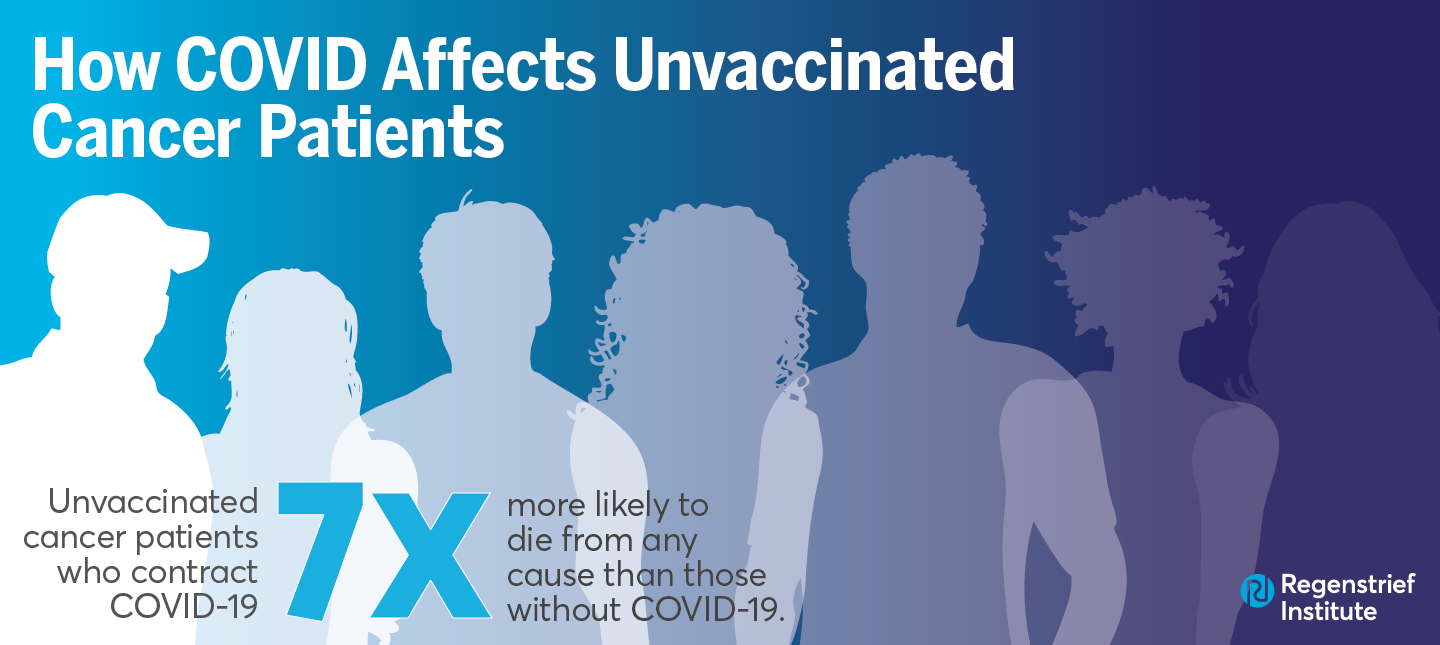Unvaccinated adult cancer patients with COVID were found to be seven times more likely to die from any cause of death than unvaccinated adult cancer patients who were not infected with the SARS-CoV-2 virus in a population study from the Regenstrief Institute.
The researchers studied adult cancer patients, whose cancer was diagnosed in 2019 and 2020, in active treatment or in remission. The study was performed using data before COVID-19 vaccines were available on ancestral strains of the SARS-CoV-2 virus.
The researchers found that — among individuals with a recent cancer diagnosis — older adults, individuals with two or more comorbid conditions such as hypertension, diabetes, coronary heart disease or chronic kidney disease, males and rural dwellers possessed higher risk of death following COVID compared to other cancer patient populations. The researchers used a variety of methods to control for other factors that might cause death, yet exposure to SARS-CoV-2 infection was consistently associated with increased risk in multiple analyses.
Individuals with COVID and lung cancer or digestive cancers had the highest risk of death. The elevated death rate of adults with these cancers who are infected with the SARS-CoV-2 virus provides a partial explanation for the higher death rate among males because both cancers are more common in men than women.
“Our findings highlight the increased risk of death for adult cancer patients who test positive for COVID and underscore the importance to cancer patients — including those in remission — of vaccinations, boosters and regular COVID testing,” said study senior author Brian Dixon, PhD, MPA, director of public health informatics at Regenstrief Institute and Richard M. Fairbanks School of Public Health. “Our results should encourage individuals diagnosed with cancer not only to take preventive action, but also to expeditiously seek out treatments available in the marketplace should they test positive for COVID.”
“Other studies have reported a lesser likelihood of risk of death for cancer patients with COVID than the seven-fold increase we found,” said Dr. Dixon. “As we noted in our paper, earlier studies were generally smaller and made calculations based on data from a single cancer center or health system. However, our comprehensive population approach using electronic health records linked to a statewide COVID testing database enabled us to analyze robust data from facilities throughout the entire state of Indiana, public health departments and the state vital records department’s mortality registry to determine diagnoses and all-cause as well as all-location mortality.”
Given these findings, the researchers recommend that individuals who are diagnosed with cancer, or who were diagnosed in the past three years, remain up-to-date on their COVID-19 vaccinations. Furthermore, individuals with a recent cancer diagnosis are encouraged to contact their providers immediately upon infection with the SARS-CoV-2 virus to discuss available treatments to prevent hospitalization and death.
“COVID-19 Diagnosis and Risk of Death Among Adults With Cancer in Indiana: Retrospective Cohort Study” is published in JMIR Cancer.
Authors of the study, in addition to Dr. Dixon, are first author Nimish Valvi, MPH, MBBS, DrPH, a Regenstrief Institute post-doctoral fellow; Hetvee Patel, M.S., and Giorgos Bakoyannis, PhD, Richard M. Fairbanks School of Public Health; David Haggstrom, M.D., MAS, Regenstrief Institute and Center for Health Information and Communication, Richard L. Roudebush VA Medical Center; and Sanjay Mohanty, M.D., Indiana University School of Medicine.
Funders of this study include Indiana University Melvin and Bren Simon Comprehensive Cancer Center and the U.S. Centers for Disease Control and Prevention.
About Brian E. Dixon, PhD, MPA
In addition to his roles as interim director of the Regenstrief Institute’s Clem McDonald Center for Biomedical Informatics and director of public health informatics for Regenstrief Institute and Indiana University Richard M. Fairbanks School of Public Health, Brian E. Dixon, PhD, MPA is a professor of epidemiology at the Fairbanks School of Public Health. He is also an affiliate scientist at the U.S. Department of Veterans Affairs Health Services Research and Development Center for Health Information and Communication, Richard L. Roudebush VA Medical Center.
About Regenstrief Institute
Founded in 1969 in Indianapolis, the Regenstrief Institute is a local, national and global leader dedicated to a world where better information empowers people to end disease and realize true health. A key research partner to Indiana University, Regenstrief and its research scientists are responsible for a growing number of major healthcare innovations and studies. Examples range from the development of global health information technology standards that enable the use and interoperability of electronic health records to improving patient-physician communications, to creating models of care that inform practice and improve the lives of patients around the globe.
Sam Regenstrief, a nationally successful entrepreneur from Connersville, Indiana, founded the institute with the goal of making healthcare more efficient and accessible for everyone. His vision continues to guide the institute’s research mission.
About the Richard M. Fairbanks School of Public Health
Located on the IUPUI and Fort Wayne campuses, the Richard M. Fairbanks School of Public Health is committed to advancing the public’s health and well-being through education, innovation and leadership. The Fairbanks School of Public Health is known for its expertise in biostatistics, epidemiology, cancer research, community health, environmental public health, global health, health policy and health services administration.









